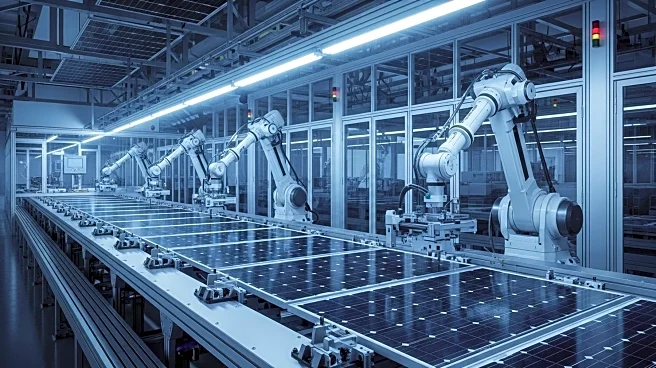What is the story about?
What's Happening?
The European Solar Manufacturing Council (ESMC) has reported that EU-27 energy and industry ministers dedicated a session on September 30, 2025, to discuss the strategic importance of solar PV manufacturing for Europe's competitiveness and clean energy transition. The session, attended by European Commission Vice-President Stéphane Séjourné, emphasized the need to strengthen the solar PV value chain and maintain production capacity within Europe. Christopher Podewils, Secretary General of ESMC, noted the strong commitment from ministers, particularly their support for a 'Made in Europe' label in public tenders. The meeting was followed by the ESIA Annual Meeting, where policymakers, manufacturers, and financial experts discussed strategies to translate ambition into action. Eike Klapper from the European Commission confirmed plans to provide operational support (OPEX) for clean-tech manufacturing through the new Competitiveness Fund, linked to existing instruments like the Innovation Fund.
Why It's Important?
The push for enhanced support for solar PV manufacturing in Europe is crucial for the continent's energy independence and sustainability goals. By strengthening the solar PV value chain, Europe aims to reduce reliance on external sources and foster a robust clean energy sector. The commitment to operational support, such as tax credits and production assistance, could accelerate the transition to renewable energy, benefiting both the environment and the economy. European manufacturers stand to gain from immediate assistance, which could bolster their competitiveness globally. This initiative reflects a broader trend towards sustainable energy solutions, aligning with global efforts to combat climate change and reduce carbon emissions.
What's Next?
The European Commission's plans to provide operational support through the Competitiveness Fund indicate a move towards concrete measures to support solar PV manufacturing. The focus will likely be on fast-tracking these initiatives to ensure immediate benefits for European manufacturers. Stakeholders, including policymakers and industry leaders, are expected to collaborate closely to implement these strategies effectively. The success of these efforts could set a precedent for other regions aiming to enhance their clean energy capabilities. Monitoring the implementation and impact of these measures will be crucial in assessing their effectiveness in strengthening Europe's solar PV sector.
Beyond the Headlines
The emphasis on a 'Made in Europe' label in public tenders highlights a cultural shift towards valuing local production and sustainability. This move could foster a sense of pride and ownership among European manufacturers, encouraging innovation and investment in the sector. Additionally, the focus on operational support reflects a broader economic strategy to enhance competitiveness and resilience in the face of global challenges. The integration of clean-tech manufacturing into existing financial instruments underscores the importance of aligning economic and environmental goals, paving the way for a sustainable future.















